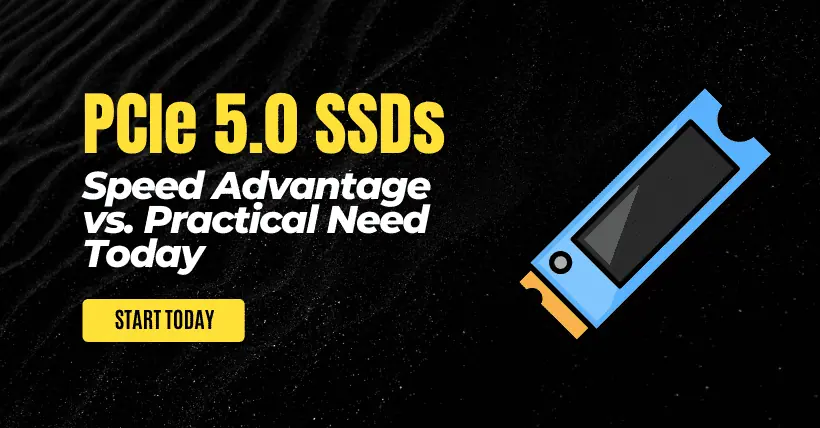Since PCIe 5.0 SSDs first appeared, many saw them as the future. Manufacturers claimed they would be the fastest SSDs, promising ultra-high-speed storage experiences.
Yet, almost two years after the initial launch (over a year since they hit the market), interest remains low. Although they offer impressive sequential transfer speeds, most computing tasks rely on random access, meaning the performance gap between PCIe 5.0 and 4.0 SSDs isn’t very large.
Even worse, the power consumption of the latest SSDs is alarmingly high, nearing the power supply limits of the M.2 standard. Trying to use one in a laptop? Forget about it; it’s far from sufficient.
So, unless you’re one of the few users who frequently needs sequential data transfer, PCIe 5.0 SSDs are a bit awkward: they cost more, consume more power, yet don’t provide a noticeable speed boost for typical tasks, making them unnecessary for most people.
Where PCIe 5.0 SSDs do excel is in one area: transferring large files or continuous data, with blazingly fast sequential read and write speeds.
But the problem is, that’s not the only scenario we encounter when using a computer! For everyday tasks, the random access speed of PCIe 5.0 SSDs isn’t much faster.
Let’s look at some data. Testing the two fastest fifth-gen drives—Crucial’s T700 and T705—alongside the top fourth-gen Samsung 990 Pro shows that in random read/write, their performances are almost identical, reducing the appeal of fifth-gen drives for most users.
Additionally, PCIe 5.0 SSDs are disappointing in other respects. You might think game loading speeds would improve, but that’s not the case. Between third-gen, fourth-gen, and fifth-gen SSDs, loading times show minimal difference.
So, when buying a drive, prioritize capacity and budget rather than the PCIe generation.
Furthermore, in terms of heat, the launch of first-generation PCIe 5.0 SSDs without heat sinks became a major issue. Some of these drives, boasting 10,000 MB/s speeds, overheated under normal testing conditions, even causing system crashes.
Media reports show that the Corsair MP700 reached 80°C after 86 seconds of data reading, prompting the system to shut down.
What does this mean? Current fifth-gen drives simply aren’t feasible for laptops, and even in desktops, keeping them stable is a challenge.
From a technical standpoint, fifth-gen SSDs are indeed impressive, but their practicality is limited for most consumers. They overheat easily, consume high amounts of power, and need large heat sinks or fans to function reliably.
That said, Silicon Motion is reportedly developing its own PCIe 5.0 controller targeting low-power needs for laptops and other small devices.
While these controllers aren’t on the market yet, they could drastically reduce PCIe 5.0 SSD heating and make them more suitable for a wider range of users.
Related:

Disclaimer:
- This channel does not make any representations or warranties regarding the availability, accuracy, timeliness, effectiveness, or completeness of any information posted. It hereby disclaims any liability or consequences arising from the use of the information.
- This channel is non-commercial and non-profit. The re-posted content does not signify endorsement of its views or responsibility for its authenticity. It does not intend to constitute any other guidance. This channel is not liable for any inaccuracies or errors in the re-posted or published information, directly or indirectly.
- Some data, materials, text, images, etc., used in this channel are sourced from the internet, and all reposts are duly credited to their sources. If you discover any work that infringes on your intellectual property rights or personal legal interests, please contact us, and we will promptly modify or remove it.








